A Virtual Private Network (VPN) offers effective protection from malware, ad tracking, hackers, spies, and censorship. But that privacy and security will cost you an ongoing subscription.
There are quite a few options out there, each with varying costs, features, and interfaces. PIA and NordVPN are two popular ones in the market, which one is better? Before making a decision, take the time to consider your options and weigh up which will best suit you in the long term.
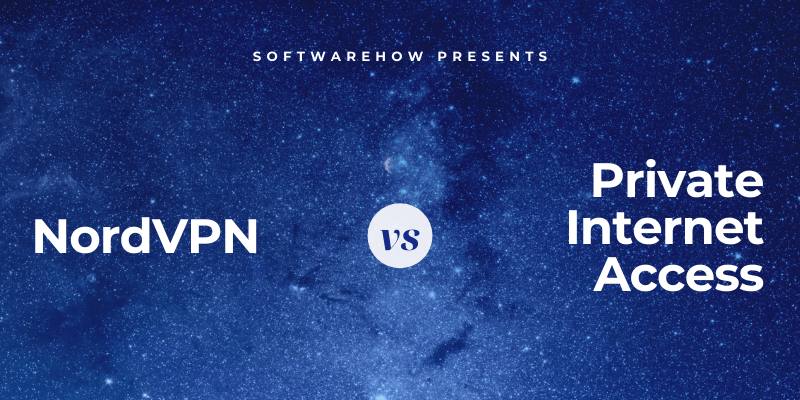
NordVPN offers a wide selection of servers around the world, and the app’s interface is a map of where they are all located. You protect your computer by clicking on the specific location in the world you want to connect to. Nord focuses on functionality over ease of use, and while that adds a little complexity, I still found the app quite straightforward. When you pay for multiple years at a time, it offers the best value for money. Read our full NordVPN review here.
PIA (Private Internet Access) is normally a little less expensive but falls behind Nord in several areas. I found it to be slower and unable to reliably connect to Netflix. But in other areas, such as user interface, privacy, and security, it’s quite competitive.
But how do they compare? Read on to find out.
Table of Contents
1. Privacy
Many computer users feel increasingly vulnerable when using the internet, and rightly so. Your IP address and system information are sent along with each packet as you connect to websites and send and receive data. That’s not very private and allows your ISP, the websites you visit, advertisers, hackers, and governments can keep a log of your online activity.
A VPN can stop unwanted attention by making you anonymous. It trades your IP address for that of the server you connect to, and that can be anywhere in the world. You effectively hide your identity behind the network and become untraceable. At least in theory.
What’s the problem? Your activity isn’t hidden from your VPN provider. So you need to choose a company you can trust: a provider that cares as much about your privacy as you do.
NordVPN has excellent privacy and “no logs” policies. That means they don’t log the sites you visit at all and only log your connections enough to run their businesses (for example, making sure you’re not using more than the number of devices allowed by your plan). They keep as little personal information about you as possible and allow you to pay by Bitcoin so even your financial transactions won’t lead back to you.
PIA is similar. The company collects minimal information at sign-up and keep no traffic or request logs. You can pay anonymously with many major brand gift cards, including Starbucks, Walmart, and Best Buy. But because they are based in the US, they may at times have no choice but to hand over information to the authorities. But they store very little information, so they won’t have much to share.
Winner: Tie. Both services store as little private information about you as possible, and don’t keep logs of your online activity. Both have a large number of servers around the world that help make you anonymous when online.
2. Security
When you use a public wireless network, your connection is insecure. Anyone on the same network can use packet sniffing software to intercept and log the data sent between you and the router. They could also redirect you to fake sites where they can steal your passwords and accounts.
VPNs defend against this type of attack by creating a secure, encrypted tunnel between your computer and the VPN server. The hacker can still log your traffic, but because it’s strongly encrypted, it’s totally useless to them. Both services allow you to choose the security protocol used.
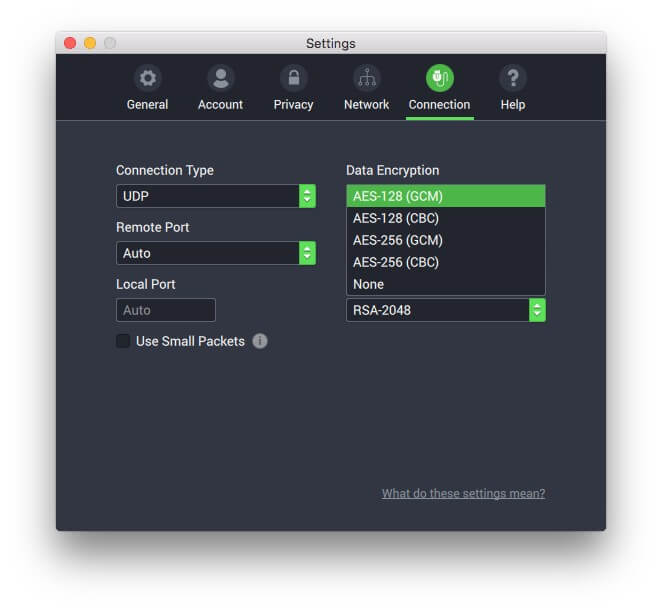
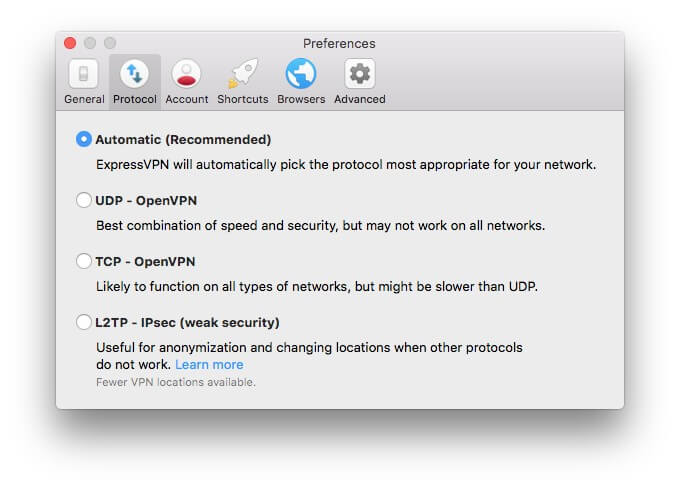
If you unexpectedly become disconnected from your VPN, your traffic is no longer encrypted and is vulnerable. To protect you from this happening, both apps provide a kill switch to block all internet traffic until your VPN is active again.
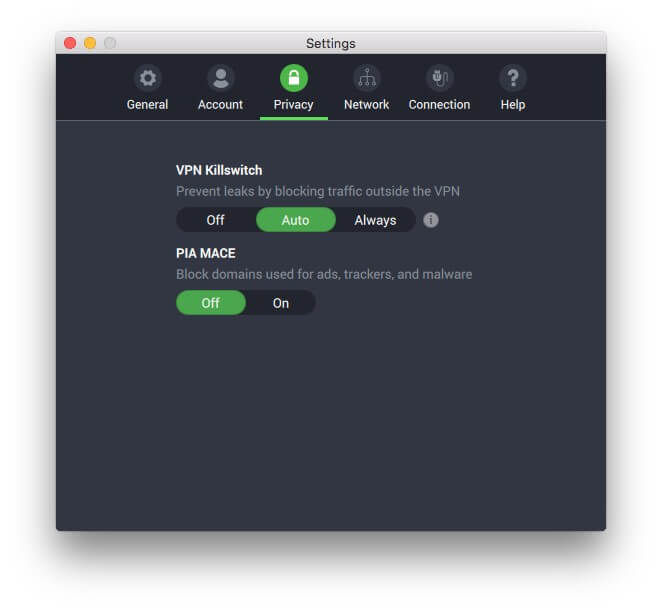
Both apps also offer a malware blocker to protect you from suspicious websites to protect you from malware, advertisers, and other threats.
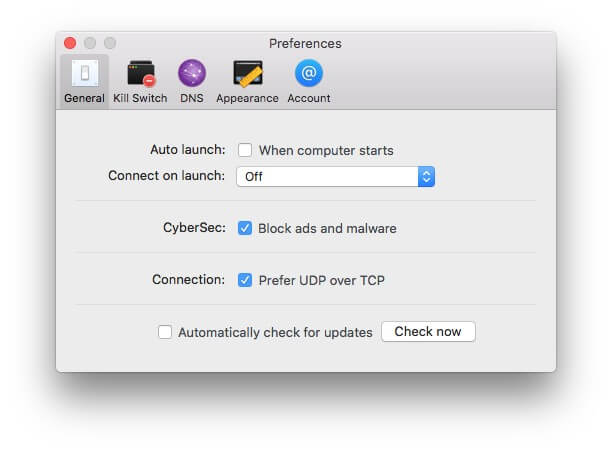
For additional security, Nord offers Double VPN, where your traffic will pass through two servers, getting twice the encryption for double the security. But this comes at an even greater expense of performance.
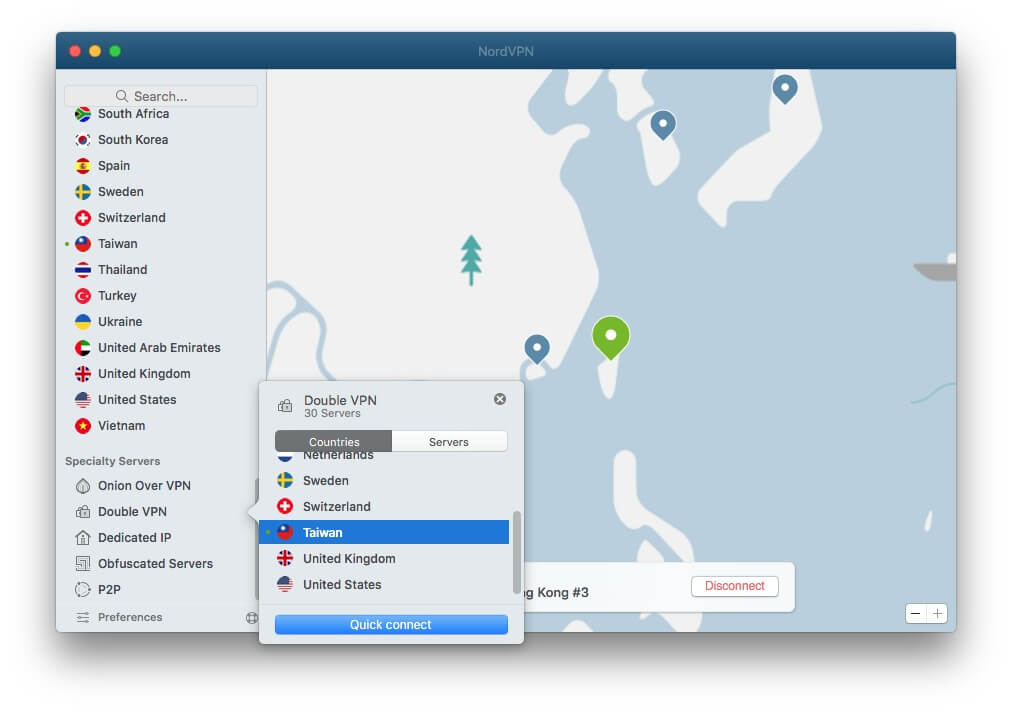
Winner: NordVPN. Both apps offer encryption, a kill switch, and a malware blocker to enhance your online security. Nord goes the extra mile by adding Double VPN as an option with twice the security.
3. Streaming Services
Netflix, BBC iPlayer and other streaming services use the geographic location of your IP address to decide which shows you can and can’t watch. Because a VPN can make it appear that you’re in a country you’re not, they now block VPNs as well. Or they try to.
In my experience, VPNs have wildly varying success in successfully streaming from streaming services, and Nord is one of the best. When I tried nine different Nord servers around the world, each one connected to Netflix successfully. It’s the only service I tried that achieved a 100% success rate, though I can’t guarantee you’ll always achieve it.
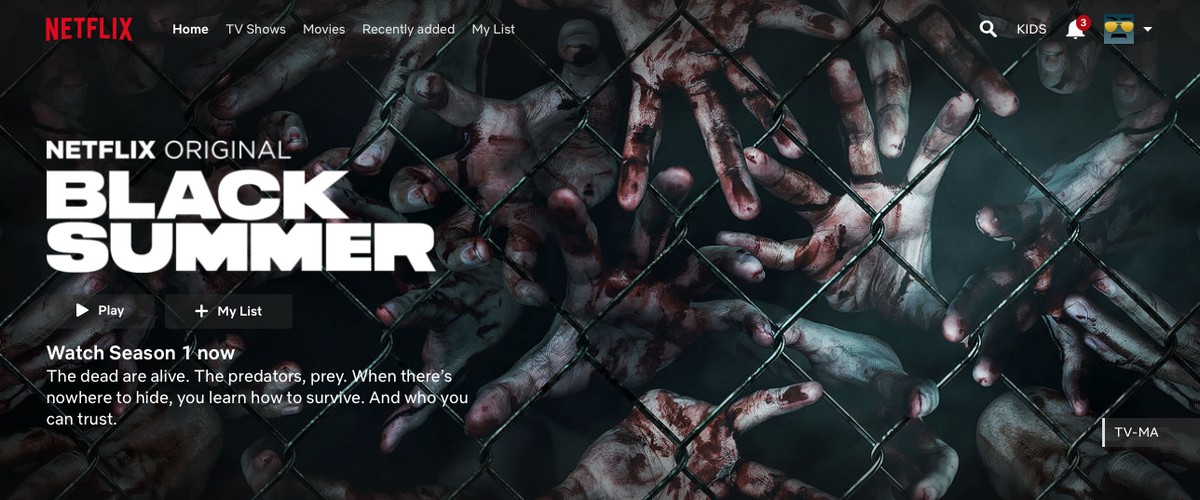
On the other hand, I found it much harder to stream from Netflix using PIA. I tried nine servers in total, and only two worked. Netflix somehow worked out that I was using a VPN most of the time, and blocked me. You may have more luck, but based on my experience, I expect you’ll have to work harder with PureVPN than NordVPN.

I had a similar experience when streaming from BBC iPlayer. Nord worked every time, while none of PIA’s UK servers was successful. Check our Best VPN for Netflix review for more details.
Winner: NordVPN.
4. User Interface
If you’re new to VPNs and want the simplest interface, PIA may suit you. Its main interface is a simple on/off switch, and that’s hard to get wrong. When the switch is off, you’re unprotected.
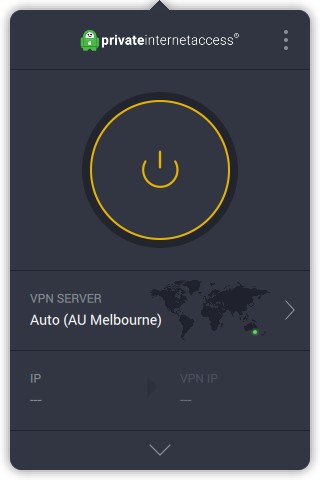
When you turn it on, you’re protected. Easy.
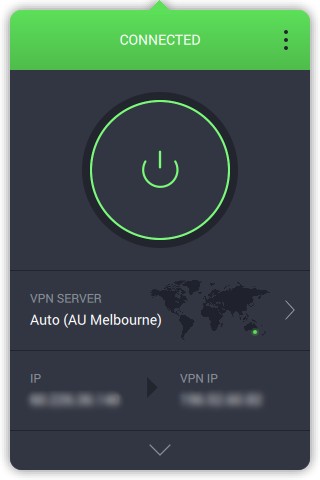
To change servers, just click on the current location and choose a new one.
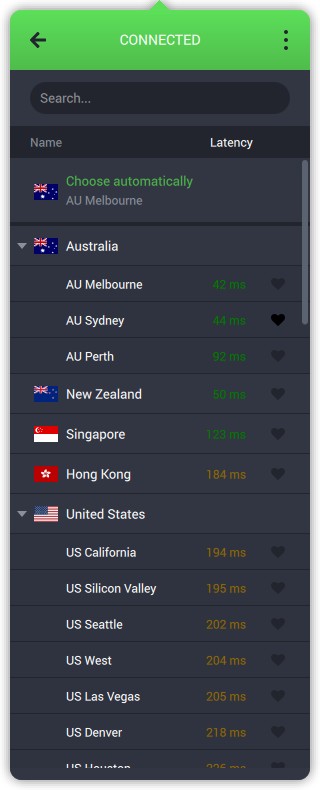
I love that PIA pings each server then sorts the list so that those with the least latency are at the top. That means you’re more likely to encounter a faster server sooner.
By contrast, NordVPN is better suited to users with some familiarity with VPNs. The main interface is a map of where its servers are located around the world. That’s smart since the service’s abundance of servers is one of its key selling points, but it’s not as straightforward to use as its rival.
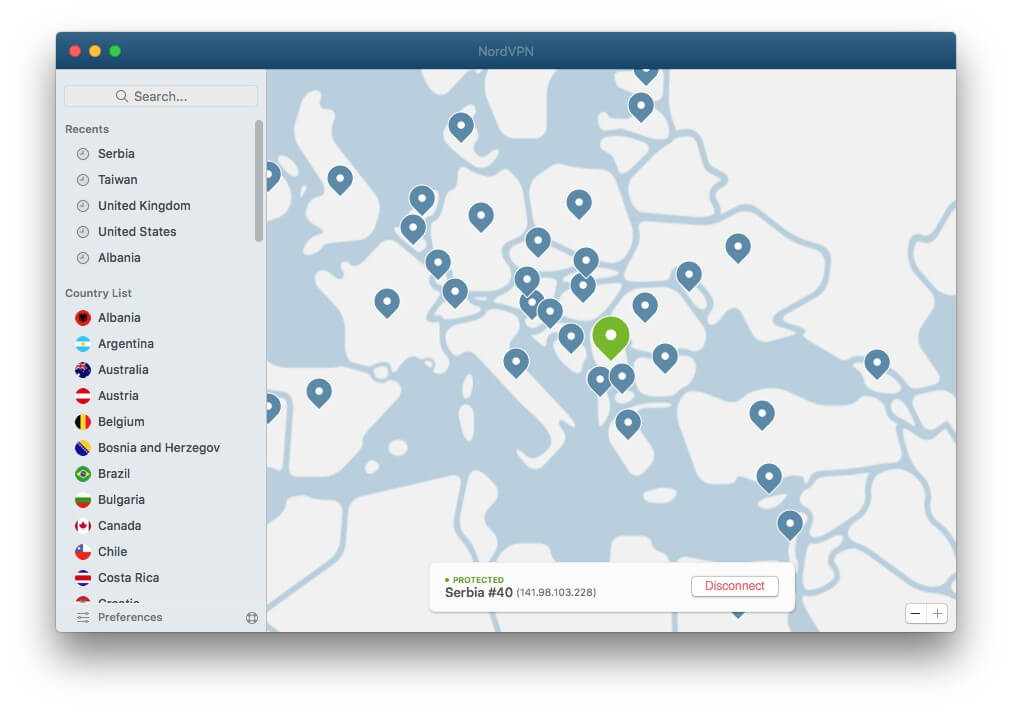
Winner: PIA is the easier to use of the two applications, but you won’t find NordVPN much harder to use. I love how PIA sorts its servers in order of increasing latency.
5. Performance
Both services are reasonably fast, but Nord is significantly faster. The fastest Nord server I encountered had a download bandwidth of 70.22 Mbps, only a little below my normal (unprotected) speed. But I found that server speeds did vary considerably, and the average speed was just 22.75 Mbps. So you may have to try a few servers before you find one you’re happy with.
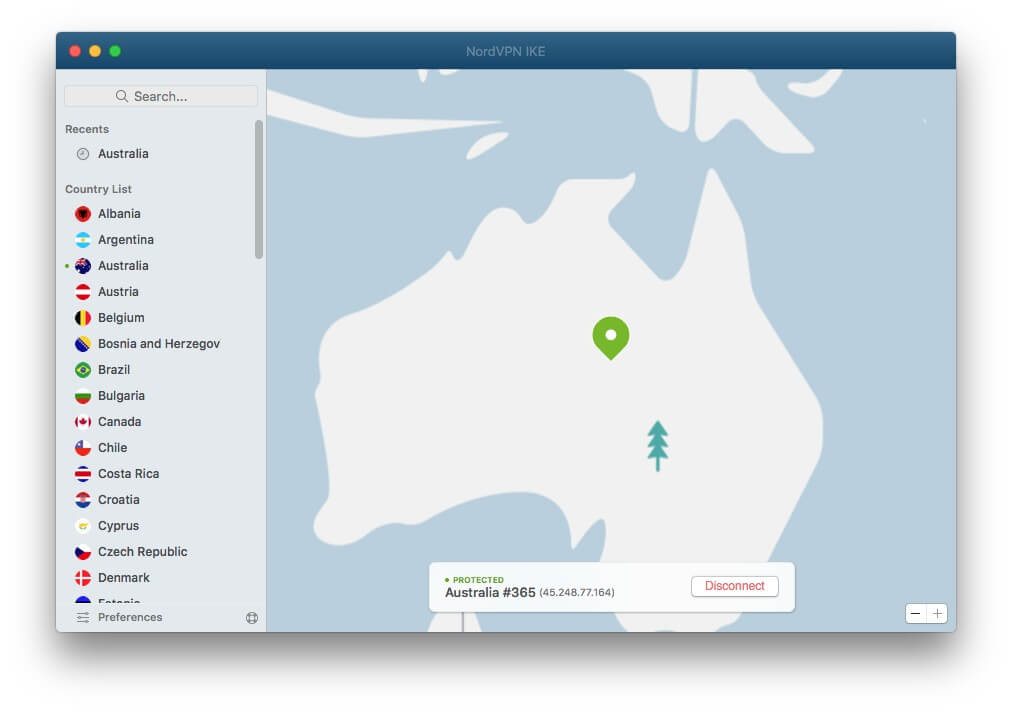
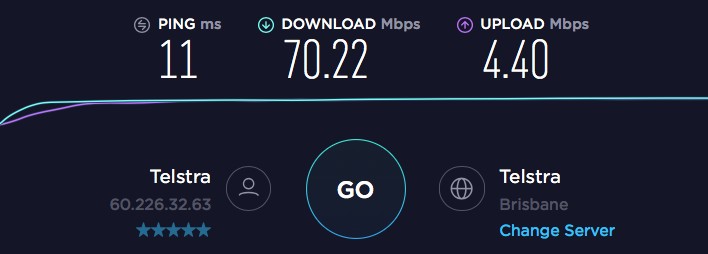
PureVPN’s download speeds were slower. The fastest server I used was able to download at just 32.71 Mbps, and the average of all the servers I tested was just 19.27 Mbps. But my unprotected internet speed was around 30% slower on the day I tested PIA, so it’s average speed may actually have a slight edge.
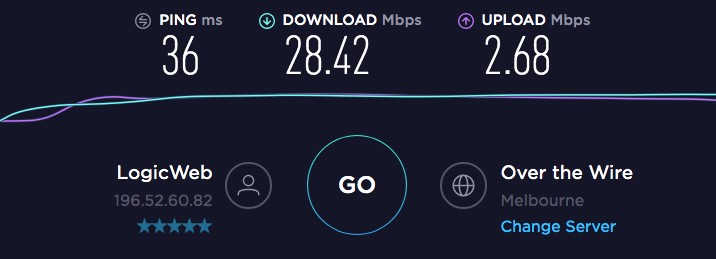
Winner: NordVPN’s fastest servers were noticeably faster than PIA’s, and the average speed of all servers tested was about the same. If you want to achieve the fastest download speeds, you’re more likely to do that with Nord if you spend some time finding a fast server.
6. Pricing & Value
VPN subscriptions generally have relatively expensive monthly plans, and significant discounts if you pay well in advance. That’s the case with both of these services.
NordVPN is one of the least expensive VPN services you’ll find. A monthly subscription is $11.95, and this is discounted to $6.99 a month if you pay yearly. Nord goes further by rewarding you for paying several years in advance: its 2-year plan costs just $3.99 a month, and its 3-year plan a very affordable $2.99/month.
PureVPN’s monthly plan is even cheaper, at $9.95 a month, and the yearly plan is currently discounted to a low $5.99. They reward you further for paying two years in advance by discounting the monthly rate to $3.11, just slightly more than the rate for Nord’s three-year plan.
Winner: Both services are very affordable. In general, PIA’s prices are a little cheaper, but if you’re willing to pay for three years in advance, Nord wins by a whisker.
Final Verdict
For those of you looking to use a VPN for the first time or prefer the easiest-to-use interface, you might want to consider PIA. At this stage, you’re probably not ready to make a multi-year commitment, and you can test the service on a single device reasonably inexpensively. In addition, you’ll become familiar with the basics of VPNs with an easy-to-understand user interface. As long as you don’t watch Netflix.
For everyone else, I recommend NordVPN. If you’re committed to VPN usage, you won’t mind paying for a few years in advance to get one of the cheapest rates on the market—the second and third years are surprisingly inexpensive. The service offers the best Netflix connectivity of any VPN I tested, some very fast servers (though you may have to try a few before you find one), more features, and superior security. I highly recommend it.
If you’re still not sure which to choose, try them both. Both companies stand behind their service with a money-back guarantee (30 days for Nord, 7 days for PIA). Evaluate each app, run your own speed tests, and try connecting to the streaming services most important to you. See for yourself which one best meets your needs.

I’ve recently tried to connect to netflix US through NordVPN and holy shit there is so much content there, watched Lennies show and cried my face off. It loaded it quickly in the best quality Netflix offered it so it was a really nice experience! had to do a few things before but this helped me https://support.nordvpn.com/General-info/SmartPlay/1047407532/How-to-securely-watch-Netflix-with-NordVPN.htm